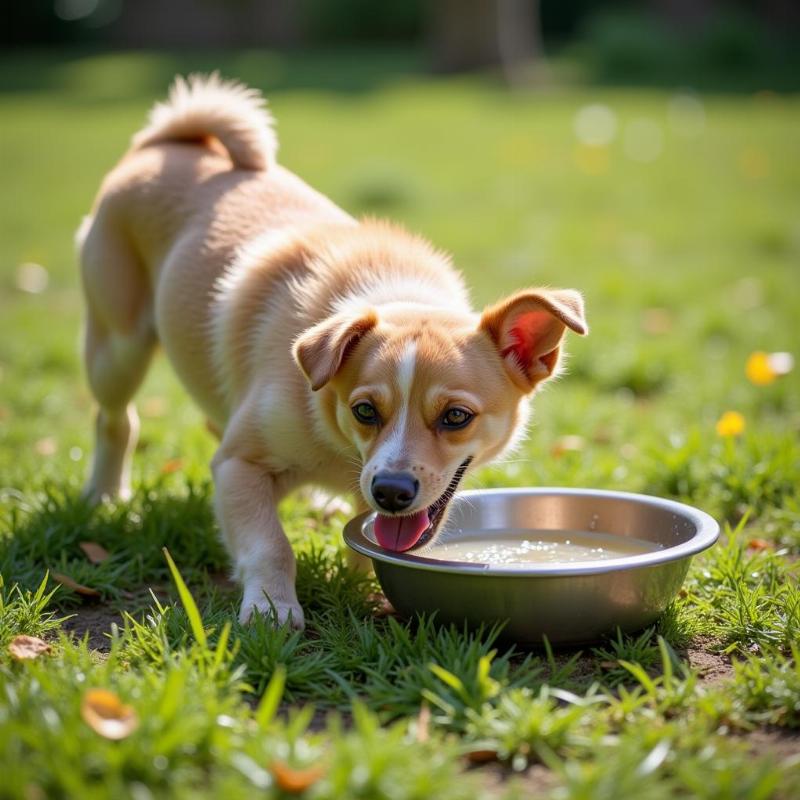Dehydration in dogs can be a serious health concern, and knowing how long your furry friend can safely go without water is essential for responsible pet ownership. This article will explore the factors influencing a dog’s water needs and provide practical advice for ensuring your canine companion stays adequately hydrated.
Factors Affecting Water Intake in Dogs
Several factors determine how much water a dog needs and, consequently, how long they can go without it. These include:
- Size and Breed: Larger dogs naturally require more water than smaller breeds. Certain breeds, like those bred for working in hot climates, may also have higher water needs.
- Activity Level: A dog romping at the dog park will need significantly more water than one lounging on the couch. Increased activity leads to more water loss through panting and sweating (through their paw pads).
- Diet: Dry kibble contributes less to a dog’s daily water intake than wet food. Dogs on a dry food diet will need to drink more water to stay hydrated.
- Weather: Hot and humid weather increases water loss through panting, making it crucial to provide ample fresh water during these periods.
 Chó thở hổn hển uống nước trong mùa hè
Chó thở hổn hển uống nước trong mùa hè - Health: Certain medical conditions, such as kidney disease and diabetes, can increase a dog’s thirst and water requirements.
The Dangers of Dehydration in Dogs
While a healthy dog can typically go without water for a few hours without serious consequences, prolonged deprivation can lead to severe dehydration. Signs of dehydration include:
- Lethargy: A dehydrated dog may appear unusually tired and uninterested in their surroundings.
- Loss of Appetite: Decreased interest in food can be an early sign of dehydration.
- Dry Gums: If your dog’s gums feel dry or sticky, they may be dehydrated.
- Sunken Eyes: In more severe cases, a dog’s eyes may appear sunken into their sockets.
- Panting and Increased Heart Rate: These are the body’s attempts to cool down and circulate fluids.
If you notice any of these signs, it’s essential to offer your dog water immediately and consult a veterinarian if the symptoms persist.
How to Keep Your Dog Hydrated
Providing constant access to fresh, clean water is the cornerstone of keeping your dog hydrated. Here are some practical tips:
- Multiple Water Bowls: Place water bowls in various locations around your home, especially if you have a multi-level house.
- Travel Water Bottles: car console seat for dogs These are essential for keeping your dog hydrated on walks, car rides, and other outings.
- Flavor Enhancement: Adding a small amount of low-sodium chicken broth or dog-safe fruits and vegetables to your dog’s water can encourage them to drink more.
- Frozen Treats: Frozen dog treats, such as ice cubes made with diluted chicken broth, can provide a refreshing source of hydration on hot days.
- Monitor Intake: Keep an eye on how much water your dog is drinking, especially during periods of increased activity or hot weather.
When to Seek Veterinary Attention
While mild dehydration can often be addressed at home, it’s essential to seek veterinary care if your dog exhibits severe symptoms or if they refuse to drink. Prompt veterinary intervention can prevent life-threatening complications.
Conclusion
Understanding how long dogs can be without water and recognizing the signs of dehydration are vital for responsible dog ownership. By providing ample fresh water and taking steps to encourage hydration, you can ensure your canine companion stays healthy and happy. Remember to consult with your veterinarian if you have any concerns about your dog’s hydration status.
FAQ
- How much water should my dog drink daily? A general guideline is approximately one ounce of water per pound of body weight per day. However, this can vary based on the factors discussed earlier.
- Can dogs drink tap water? Generally, yes, but ensure your tap water is safe and free of contaminants.
- What are the signs of severe dehydration in dogs? Signs include lethargy, loss of appetite, dry gums, sunken eyes, rapid panting, and increased heart rate. Seek immediate veterinary attention if you notice these signs.
- What should I do if my dog refuses to drink water? Try adding a flavor enhancer or offering ice cubes. If they continue to refuse, consult a veterinarian.
- Can dogs drink bottled water? Yes, bottled water is safe for dogs, but ensure it doesn’t contain added sweeteners or artificial flavors.
Related Articles
Beautdogs.us is your trusted online source for comprehensive and engaging information about dog care, breed specifics, and ensuring a fulfilling companionship with your canine friend. Whether you are a new dog owner or an experienced one, our expert-driven content offers practical advice and the latest insights into the world of dog care, health, and trends. We pride ourselves on being your go-to resource for all things dog-related. Contact us at [email protected] or +1 501-555-7529 for more information. Visit Beautdogs.us today!